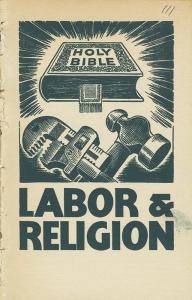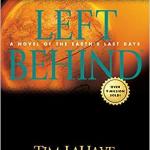This Labor Day, I had the joy of talking with Dr. Heath Carter, Associate Professor of American Christianity at Princeton Theological Seminary, about evangelicalism’s historical relationship to the Labor Movement in America. Enjoy!
Heath Carter! My dear friend. What a joy to talk to you this Labor Day. First, for those who don’t know you–yet–can you tell readers a bit about you?
Of course! I grew up in evangelical churches in Kansas and California, studied Christian theology at a Jesuit university in DC, completed a master’s in American religious history at the University of Chicago, and then my PhD in United States History at the University of Notre Dame, where I had the privilege to learn from the likes of Mark Noll. I lived in Chicago for more than a decade, and it was there, during grad school, that I first became interested in the intertwined histories of labor and Christianity in the United States. After finishing my PhD I taught for seven years at Valparaiso University before joining the faculty of Princeton Seminary in 2019. Here, in addition to teaching and writing about the intersection of Christianity and public life in the modern United States, I direct our PhD program. I also have the joy of co-editing (with Mark Noll and Kathryn Gin Lum) Eerdmans’ Library of Religious Biography series.
It’s a great series! And so cool to hear how people’s upbringings, historical interests, and geographies can sometimes all lead to avenues of inquiry. It sounds like your time in Chicago, for instance, offered important intellectual connections for you. Christianity and the Labor movement are not often associated together, though perhaps they should be. Why do you think that is?
This is certainly true in the United States these days. In some Canadian and European circles that association would remain stronger, I think. In the US, we are still living in the long shadow of a momentous backlash to the New Deal. By the 1930s there was a widespread sense in all kinds of churches that economic inequality was deeply sinful and that Christian faith therefore went hand-in-hand with organized labor.
But in the mid-twentieth century a “gospel of free enterprise” reemerged on the scene; and in the Cold War era it gained powerful support from state, corporate, and religious actors. This gospel gloried in the old doctrine of laissez faire, holding that God had ordained capitalism, corporations, and free markets as the truly Christian way to structure economic life. Especially as organized labor became more intentionally interracial, the gospel of free enterprise took on the guise of common sense in many white Christian communities.
The civil rights era witnessed a fundamental realignment of the country’s political coalitions but labor unions remained largely in the Democratic fold. So over the last generation, as the Republican Party forged a historic alliance between white evangelicals and Catholics, and as political polarization deepened significantly, Christians on the right–even those whose parents or grandparents belonged to a union–have often had yet another reason to look askance at labor. These are some of the reasons for the disconnect you mentioned. Though I should add that the growing entrenchment of the gig economy is stirring up new passions and possibilities, I think, as we saw with Bernie Sanders’ surprisingly popular run for the Democratic nomination and in the political orientation of millennials and Gen Z. So it will be interesting to see what the future holds.
Indeed! Thanks for explaining that. I’m glad you pointed out not only the ideological wedges, but the partisan ones. We hear “Socialism” often invoked by political actors and strategists (and decades ago, segregationists) as inherently un-Christian. Why, post-Cold-War, do you think “socialist” has had such staying power as a foil for Christianity?
Even before the Cold War, “socialist” was a label that some Americans wielded against anyone they didn’t like. I think of the red scares of the late nineteenth and early twentieth centuries. But it is also true that those earlier periods also saw the rise of an active and growing Christian socialist movement in the United States. That remained somewhat the case in the mid-twentieth century, thanks to the witness of folks like Dorothy Day, Norman Thomas, and even Martin Luther King, Jr., who embraced something like democratic socialism in the final years of his public life. But at the height of the Cold War there was also massive state investment in promoting free enterprise and powerful figures like J. Edgar Hoover (as our colleague Dr. Lerone Martin underscores in his new book) used the full force of the federal government to label anyone they deemed a threat as socialist, radical, etc. The impact on life in the US lingers still, though as I suggest above, I do wonder if things are finally starting to shift again.
You’re so hopeful. I love that. And good to remind us of those Christian socialists in the tradition. In your first book, Union Made: Working People and the Rise of Social Christianity in Chicago (Oxford, 2015), you argue– compellingly and beautifully–that working people were really at the heart of the Social Gospel, not just middle class clergy or social reformers. Can you tell us a bit about some of those people?
So many of them were regular folks who are not remembered today but who, in their time, changed church and world alike. They mostly had no formal theological training but they nonetheless believed firmly in their hearts that, in the context of a deeply unequal society, God took the side of the poor and downtrodden. The Bible was full of warnings to the rich, after all, and no less than Jesus himself had declared that the laborer was worthy of their hire (Luke 10:7). I think for example of a Scottish immigrant, unionized printer, and devout evangelical by the name of Andrew Cameron, who found it absolutely appalling that the churches of his day tended to side with the wealthy. He loved to quote scripture against ministers who he believed were preaching false (anti-labor) gospels and once remarked that he took reassurance from his unwavering belief in an old-fashioned, orthodox hell, where he believed the enemies of justice would one day find themselves.
Whoa! You really bring Cameron to life there. Why did you think it important to capture the influence of these Christian laborers? What do we lose if we exclude religion from labor movements? What do we lose if we exclude workers from American Christianity?
I was captivated by their witness long before I realized how influential they had been. I first started working on that project in the throes of the 2008 financial crisis and in that moment especially, the late-nineteenth century’s free-wheeling debates about the morality of capitalism struck a nerve. What I realized, over the course of the research and writing, was that it was workers, first and foremost, who changed the churches’ minds on organized labor, helping to galvanize a new and widespread vein of Christian social teaching on the living wage, the right to collective bargaining, and the like. So religious historians need to be mindful of workers because they have often had an enormous impact on Christian ideas and institutions, while labor historians need to be mindful of faith because it has played (and continues to play!) such a tremendous role in shaping everyday life and political movements in working-class communities and far beyond. I will just add that, even beyond questions of historical methodology, I think there are good Christian reasons to pay attention to ordinary folks. Jesus was a carpenter, as my characters loved to underscore! Could there be any clearer evidence that we have much to learn from people and places far from the limelight?
 (Labor and Religion. Congress of Industrial Organizations. 1946. AFL-CIO Support Services Department, Publications; https://exhibitions.lib.umd.edu/unions/social/religious-freedom)
(Labor and Religion. Congress of Industrial Organizations. 1946. AFL-CIO Support Services Department, Publications; https://exhibitions.lib.umd.edu/unions/social/religious-freedom)
Yes. So good. It betrays historians’ own snobberies, in so many realms to ignore religion. You say that faith continues to play a role in shaping political movements today. Do you think that American workers are thinking about the theological implications for economic paradigm shifts and society? Thinking of automation, globalization, etc…
Absolutely. Across the country Christians– Pentecostal, Catholic, Presbyterian, nondenominational, and more– are making connections between their faith and their lives as workers. We get glimpses of this from time to time in stories about unionizing drives at Starbucks locations, Amazon warehouses, and more. I don’t think we have a good sense yet of what is coming. But as I mentioned, the entrenchment of the gig economy and corresponding disappearance of pensions and even just halfway-decent health insurance policies is destabilizing an anti-labor consensus that held for much of the period stretching from the Reagan revolution to today. The old saws about “labor bosses” just don’t hold the same weight they did a generation ago. At least in healthcare, education, and the hospitality and service sectors, there are real opportunities for organizing moving forward. It will be fascinating to see how faith figures into the mix.
It certainly will! It’s interesting, too, evangelical Christians, while they don’t talk much about Labor, do occasionally talk about work. I’m thinking of books like Every Good Endeavor, Grace at Work, etc. Does a theology of work lead to support for workers/ reforms for workers? What is an evangelical theology of work missing? Or is it just political?
This is a great question. From what I’ve seen, theologies of work often do not promote labor organizing. Sometimes they function as bulwarks against it. I think someone like Matthew Kaemingk is trying to forge a synthesis that brings together a theology of work with an at least moderately pro-labor gospel. I’ll be interested to see to what extent that kind of position catches on in evangelical circles. But the main thing these theologies of work are often missing in my experience is a robust account of exploitation along with a sophisticated analysis of the employer-employee relationship. I worry about the ways that these theologies can therefore baptize unjust situations. The reality is that most individuals don’t have a leg to stand on when it comes to negotiating their compensation and working conditions. Only collective bargaining can yield that kind of leverage.
Hmm, yes. So individualized in scope. Well, Heath, one more. I know you are hard at work on a new project on the Social Gospel…can you tell us a bit about On Earth as it is in Heaven?
Sure thing. My current book builds on my first but zooms way out to tell a sweeping story about the rise and powerful legacies of social Christianity in this country. Fundamentally, I’m interested in how equality–which has, in the wider sweep of history, only rarely been a Christian value (and still is not in many cases today, alas)–came to the center of American Christian life in the century stretching from the Civil War to the Civil Rights movement. It’s a story about how near-constant pressure from the grassroots helped folks on the inside of church and state to transform institutions and expand the fight for a more equal society. They didn’t succeed in eliminating economic and racial inequality, but by the early 1970s they had come about as close as anyone ever has.
Wow, I can’t wait to read it! To close, what would you like evangelicals to hear this Labor Day?
You can support workers in your community and across the world, not in spite of your faith but because the Bible tells you so!
Perfect. Thank you, Heath!














